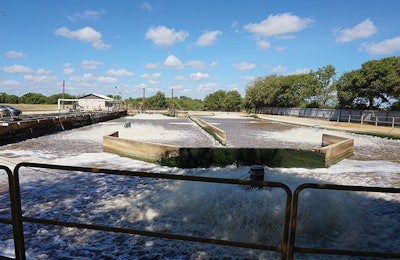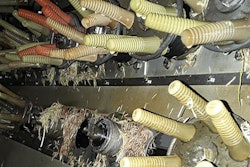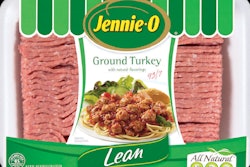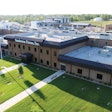
Tyson Foods Inc.’s Seguin, Texas, complex prioritizes its relationship with the local community. Located within the city limits of the town, it’s made limiting odors and other nuisances a key plank of its operation.
Along with that, the complex’s poultry wastewater operation pretreats water to a level higher than necessary for discharge to the city of Seguin, Texas’, municipal treatment system. Due to its significantly improved relationship with its neighbors, the facility was selected as the winner of the 2019 U.S. Poultry & Egg Association’s Clean Water Award in the pretreatment category.

From left: Dan Lee, William Smith and Kynan Barry, Tyson Foods (Courtesy Paul Bredwell)
A good neighbor
The judging committee was impressed with how much the facility’s relationship with the community has improved over the years. The complex, which received an honorable mention in the category in 2018, is located within city limits and across the street from Texas Lutheran University’s campus. Residential yards, and a municipal hike and bike trail, run along the wastewater complex.
In the past, a community advisory group was formed to deal with nuisances associated with the plant. Although that problem is long solved, the plant maintains the group and prioritizes growing its relationship with its neighbors and the local government.
The Seguin operation employs four air scrubbers to limit odor emissions. Controlling emissions is significant because the operation on-site includes processing and rendering. The plant also installed metal privacy fencing around the wastewater facility to improve the view of the plant’s residential neighbors and those on the trail.
Wastewater treatment
Water is first treated in a dissolved air flotation (DAF) unit, which utilizes a binding chemical to improve solids removal. It then flows into a raceway-style oxidation ditch where anaerobic digestion occurs. After that, water is treated in a second DAF unit and discharged to the city. Sludge is collected from the DAF units and disposed of by Tyson.
The treatment process uses a flow-controlled chemical dosing system that doses chemicals based on water flow rate through the DAF units. This helps ensure proper water treatment at higher flow rates and eliminates chemical waste at lower flow rates.
In the last year, the treatment plant added a polymer make down system to maximize the effectiveness of the polymers used in treatment by delivering a precise dilution to the DAF units.
Sustainability efforts
The Seguin complex utilizes programs to reduce the overall amount of water used on site and its total carbon footprint.
All told, the complex is able to reuse about 200,000 gallons of treated effluent in non-contact applications. The site’s processing plant employs a system that captures and filters water from its bird washers. That water is reused in evisceration and picking.
Beyond require waste management, the Seguin facility recycles in order to reduce its landfill contribution. Its current recycling programs include: cardboard, electronic waste, office paper, plastics such as empty totes and drums, scrap metal and wooden pallets.


















